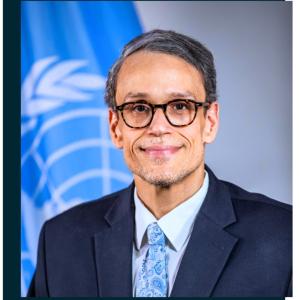H.E. Ministry of the Interior,
Mr. Chairman of the National Commission on Small Arms and Light Weapons,
Ladies and Gentlemen, Officers of the Defense and Security Corps,
Ladies and Gentlemen, Representatives of Government Institutions,
Representative of the European Union,
Mr. Representative of the United Nations Regional Center for Peace and Disarmament in Africa (UNREC),
Mr. Representative of the Regional Center on Small Arms and Light Weapons (RECSA),
Ladies and Gentlemen, Representatives of Civil Society Organizations,
Ladies and Gentlemen, Distinguished Guests,
(Words of Courtesy)
We are gathered today, 29 January, here in Banjul, to launch the work of the national workshop for the development of the National Action Plan on Small Arms and Light Weapons. This workshop will equip the National Commission with important concepts to take into account when developing its National Action Plan on Small Arms and Light Weapons. In addition, this workshop will be an opportune moment to discuss progress, challenges and lessons learned regarding the adoption and implementation of arms control initiatives to effectively combat illicit proliferation of SALW in The Gambia.
(Challenges, causes and consequences of SALW)
To recall, the illicit proliferation of small arms and light weapons (SALW) encompasses several challenges and has dramatic consequences on human lives. Indeed, the illicit circulation and use of SALW constitute a threat to international peace and security as well as to socio-economic development. This dynamic is palpable on the continent, particularly in West Africa with a deteriorated security situation due to the presence and increased activities of violent extremist groups, the diversion of SALW, economic tensions, climate change, the race for natural resources, not to mention a tense, polarized international geopolitical context marked by increasingly violent armed confrontations. Such dynamics, unequivocally, lead to loss of human life, undermine humanitarian efforts and undermine the authority of the State. A recent estimate by the African Union and the NGO Small Arms Survey highlighted that over 40 million small arms and light weapons were circulating on the continent and were being used by non-state actors (private individuals/companies and non-state armed groups). Of the 40 million SALW recorded, 80 percent are neither registered nor marked, making them almost impossible to trace. Small arms and light weapons remain the leading cause of violent deaths worldwide, both in conflict and non-conflict contexts. In 2020, 40 percent of violent deaths worldwide were related to the use of firearms.
(UN/Partnership Response)
In response to this, the United Nations Regional Offices for Disarmament Affairs (UNODA), including the Regional Centre for Peace and Disarmament in Africa (UNREC), which I represent, play a vital role in coordinating international and regional responses to the scourge of illicit arms. Through its support for the Arms Trade Treaty (ATT) and the United Nations Programme of Action on Small Arms, UNODA, through UNREC, provides essential technical assistance, policy guidance and capacity building to African States. These efforts aim to strengthen national arms control frameworks and enhance regional cooperation to combat arms trafficking. In addition, UNODA supports disarmament, demobilization and reintegration (DDR) programmes, which are critical to the success of amnesty initiatives across Africa. Moreover, an effective fight against the illicit proliferation of SALW constitutes the lasting conditions for the socio-economic development of a country, in this case, The Gambia.
Ladies and Gentlemen,
(Cooperation/synergy of actions UN in The Gambia)
Strengthened cooperation between the United Nations and the National Commission on Small Arms and Light Weapons and its partners gathered around this table today, will lead to an effective national response to combat the illicit trafficking of small arms and light weapons. In this regard, it is important to emphasize and encourage synergy of actions between the United Nations country team, UNREC, the National Commission and national partners for the implementation of the United Nations Programme of Action on SALW, and regional instruments in this area, in particular the ECOWAS Protocol on Small Arms and Light Weapons. Equally important, this synergy of actions will further contribute to the implementation of the United Nations Sustainable Development Cooperation Framework (UNSDCF) in The Gambia, the main instrument of the United Nations system (UNS) for planning and carrying out development activities aimed at supporting the implementation of the Sustainable Development Goals (SDGs) by 2030.
I have no doubt that by combining our efforts, hand in hand, we will succeed in maintaining peace, security and stability in The Gambia, thus contributing to the prosperity of West Africa.
Ladies and Gentlemen,
Thank you for your attention and I wish you all a fruitful workshop.
Thank you.



